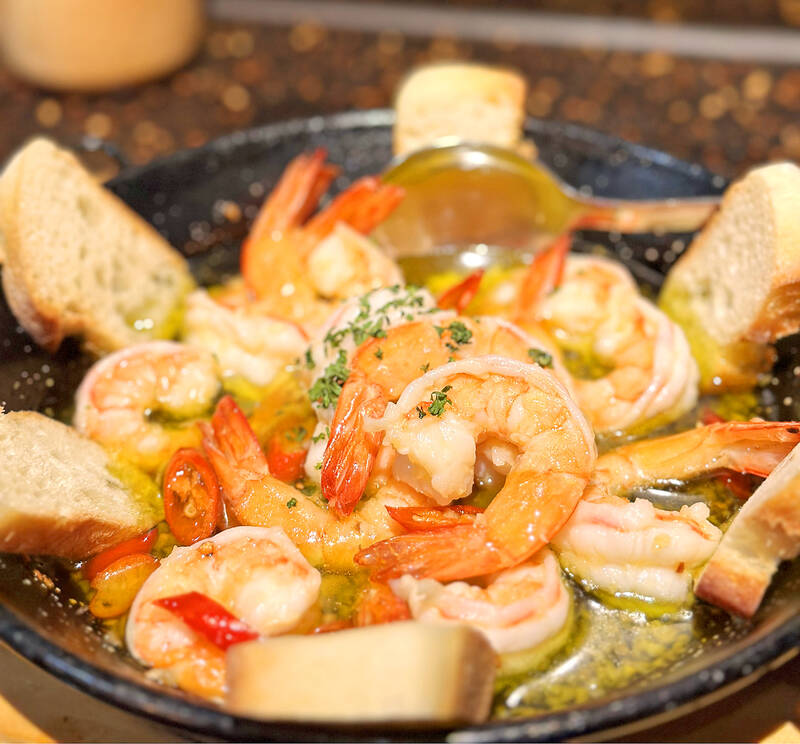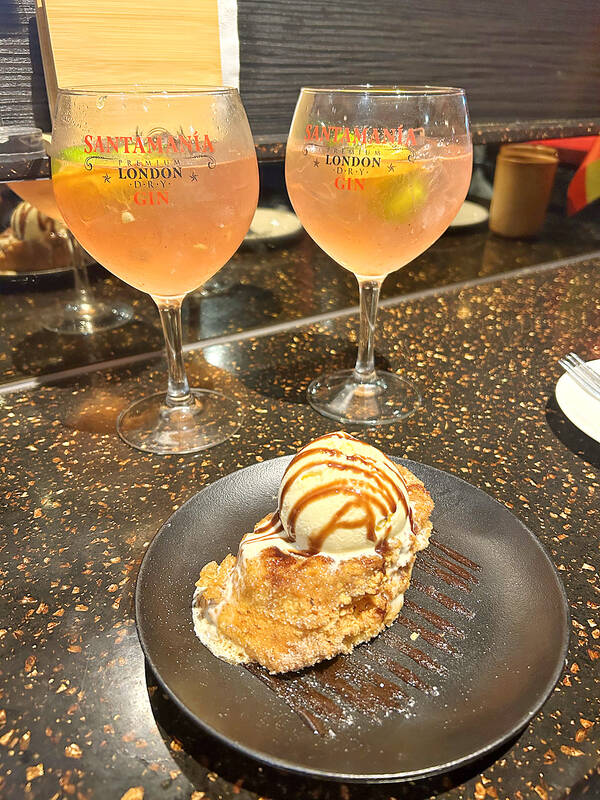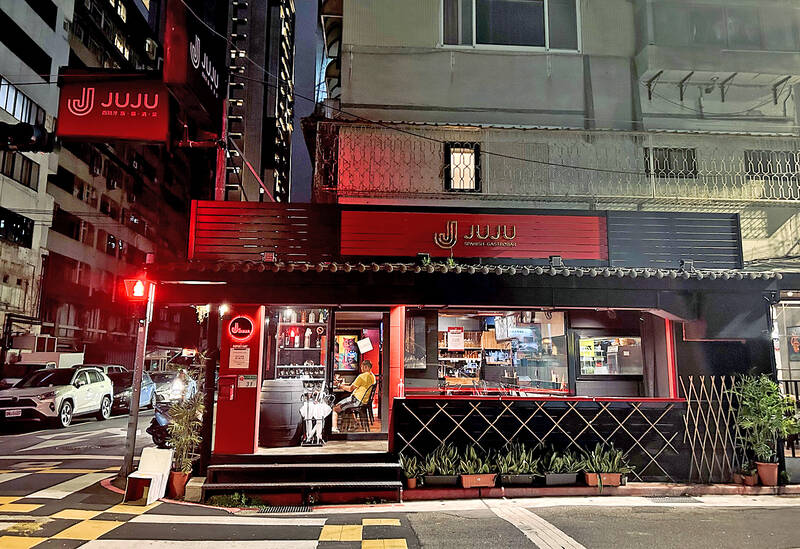Dimmed red lighting and cozy corners, the soft glow from the streetlights outside; the music, modern yet sexy, envelops hushed conversations. JUJU entices us to their snug Spanish spot to clink wine glasses and share indulgent dishes. This place was designed for sultry romantic evenings.
But be warned: the tapas use an atomic bomb of garlic, a daring choice for date night.
Entering from a rainy night in Songshan District (松山), we’re hit with that intoxicating garlic and the warmth of a charming bistro hitting the sweet spot between busy and bustling. I was looking to impress, and I hit the jackpot.

Photo: Hollie Younger
Hailing from the volcanic island paradise of Tenerife, Spanish native chef Pablo Lorenzo floats around the dining area, offering recommendations, mixing drinks and whipping up delicious small plates in the open kitchen.
Entering their seventh year, JUJU is a family affair of passion and perfection. Except for the fresh produce, their beers and wines, spices and aromatics, even the charcuterie and cheeses are imported from Spain. Lorenzo’s cousin, a professional jamon slicer, regularly flies to Taipei with certified Iberico ham and supplies JUJU’s charcuterie boards with the premium cuts, cured for 36 or 48 months and carved into silky, salty slices, straight off the leg. A plate of Iberico ham (NT$900) with a jug of fresh sangria (NT$590) forms the perfect introduction to this leisurely and intimate culinary experience.
Many sangrias are in fact an amateur amalgamation of red wine and soggy fruit. But JUJU’s sharing jars are a one-way ticket to a sunny veranda in Seville, a holiday in a glass. Pablo also imports gin from the Balearic Islands, using a traditional and simple Menorca-made gin for JUJU’s signature gin and tonic (NT$320), elevated in-house with rosemary and berries for a light, summery spritz.

Photo: Hollie Younger
In homage to his Canary Island home, located off of continental Africa, Lorenzo’s menu fuses Spanish classics with fresh seafood and South American flavors; his menu features Venezuelan arepas, akin to a taco with a starchy, maize dough casing.
The more continental tapas list offers a wide range from classic croquettes to more opulent braised octopus; Lorenzo recommends sharing three to four per couple.
The signature here, that Lorenzo implores we try, are the garlic shrimp (NT$550). Served in an individual cast-iron pan, the shrimp are plump and pink, doused in rich garlic oil amplified with fresh red chili. Loaded onto the crisp toasts, it’s a yummy mouthful.

Photo: Hollie Younger
Our next order from the sea is the seafood paella (NT$430), conveniently served tapas-size in miniature pans. The mussels are huge, the clams juicy and we’re delighted with a further helping of those fresh prawns.
The final tapas; Beef Tongue Pintxos (NT$360). In northern Spain’s Basque region, traditional taverns serve bite sized appetizers on tiny crispy toast: the pintxo. JUJU’s take uses ample slices of tender, buttery beef tongue on a bed of soft and tangy cream cheese. It’s incredibly rich, but strikes just the right balance — good things come in small portions.
Think tapas, and desserts don’t usually come to mind, but a hugely popular dish is the Torrijas (NT$280). Bread soaked in cinnamon milk and fried, it’s the cakier, fluffier cousin of the churro, topped with vanilla ice cream. A little something sweet sees off a smorgasbord of authentic, bold Spanish cuisine — full-bodied flavors yet never too heavy.

Photo: Hollie Younger
We finish the evening watching the world go by from the covered terrace, savoring the last of a fruity gin and tonic as we reacclimatize from sunny Spain to rainy Taipei.

Photo: Hollie Younger

On April 26, The Lancet published a letter from two doctors at Taichung-based China Medical University Hospital (CMUH) warning that “Taiwan’s Health Care System is on the Brink of Collapse.” The authors said that “Years of policy inaction and mismanagement of resources have led to the National Health Insurance system operating under unsustainable conditions.” The pushback was immediate. Errors in the paper were quickly identified and publicized, to discredit the authors (the hospital apologized). CNA reported that CMUH said the letter described Taiwan in 2021 as having 62 nurses per 10,000 people, when the correct number was 78 nurses per 10,000

As we live longer, our risk of cognitive impairment is increasing. How can we delay the onset of symptoms? Do we have to give up every indulgence or can small changes make a difference? We asked neurologists for tips on how to keep our brains healthy for life. TAKE CARE OF YOUR HEALTH “All of the sensible things that apply to bodily health apply to brain health,” says Suzanne O’Sullivan, a consultant in neurology at the National Hospital for Neurology and Neurosurgery in London, and the author of The Age of Diagnosis. “When you’re 20, you can get away with absolute

May 5 to May 11 What started out as friction between Taiwanese students at Taichung First High School and a Japanese head cook escalated dramatically over the first two weeks of May 1927. It began on April 30 when the cook’s wife knew that lotus starch used in that night’s dinner had rat feces in it, but failed to inform staff until the meal was already prepared. The students believed that her silence was intentional, and filed a complaint. The school’s Japanese administrators sided with the cook’s family, dismissing the students as troublemakers and clamping down on their freedoms — with

As Donald Trump’s executive order in March led to the shuttering of Voice of America (VOA) — the global broadcaster whose roots date back to the fight against Nazi propaganda — he quickly attracted support from figures not used to aligning themselves with any US administration. Trump had ordered the US Agency for Global Media, the federal agency that funds VOA and other groups promoting independent journalism overseas, to be “eliminated to the maximum extent consistent with applicable law.” The decision suddenly halted programming in 49 languages to more than 425 million people. In Moscow, Margarita Simonyan, the hardline editor-in-chief of the